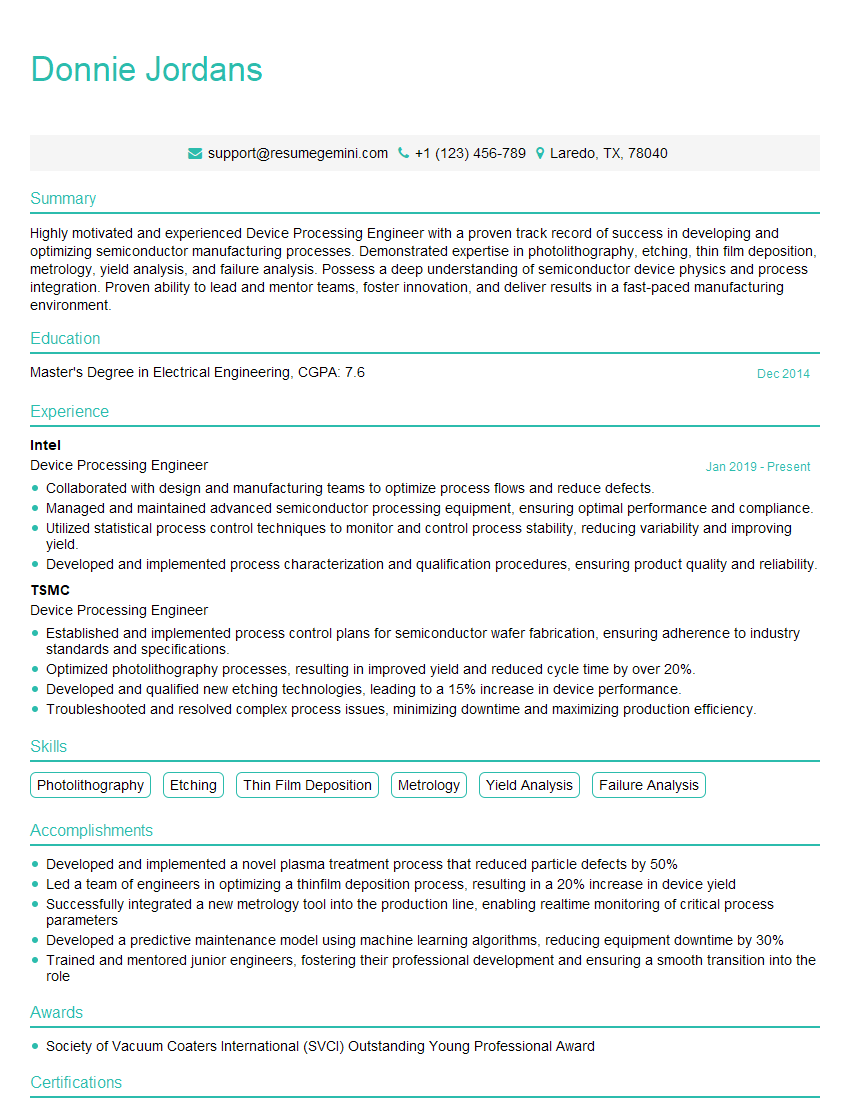Are you a seasoned Device Processing Engineer seeking a new career path? Discover our professionally built Device Processing Engineer Resume Template. This time-saving tool provides a solid foundation for your job search. Simply click “Edit Resume” to customize it with your unique experiences and achievements. Customize fonts and colors to match your personal style and increase your chances of landing your dream job. Explore more Resume Templates for additional options.

Donnie Jordans
Device Processing Engineer
Summary
Highly motivated and experienced Device Processing Engineer with a proven track record of success in developing and optimizing semiconductor manufacturing processes. Demonstrated expertise in photolithography, etching, thin film deposition, metrology, yield analysis, and failure analysis. Possess a deep understanding of semiconductor device physics and process integration. Proven ability to lead and mentor teams, foster innovation, and deliver results in a fast-paced manufacturing environment.
Education
Master’s Degree in Electrical Engineering
December 2014
Skills
- Photolithography
- Etching
- Thin Film Deposition
- Metrology
- Yield Analysis
- Failure Analysis
Work Experience
Device Processing Engineer
- Collaborated with design and manufacturing teams to optimize process flows and reduce defects.
- Managed and maintained advanced semiconductor processing equipment, ensuring optimal performance and compliance.
- Utilized statistical process control techniques to monitor and control process stability, reducing variability and improving yield.
- Developed and implemented process characterization and qualification procedures, ensuring product quality and reliability.
Device Processing Engineer
- Established and implemented process control plans for semiconductor wafer fabrication, ensuring adherence to industry standards and specifications.
- Optimized photolithography processes, resulting in improved yield and reduced cycle time by over 20%.
- Developed and qualified new etching technologies, leading to a 15% increase in device performance.
- Troubleshooted and resolved complex process issues, minimizing downtime and maximizing production efficiency.
Accomplishments
- Developed and implemented a novel plasma treatment process that reduced particle defects by 50%
- Led a team of engineers in optimizing a thinfilm deposition process, resulting in a 20% increase in device yield
- Successfully integrated a new metrology tool into the production line, enabling realtime monitoring of critical process parameters
- Developed a predictive maintenance model using machine learning algorithms, reducing equipment downtime by 30%
- Trained and mentored junior engineers, fostering their professional development and ensuring a smooth transition into the role
Awards
- Society of Vacuum Coaters International (SVCI) Outstanding Young Professional Award
Certificates
- Certified Manufacturing Engineer (CMfgE)
- Certified Six Sigma Black Belt (CSSBB)
- Certified Quality Engineer (CQE)
- Certified Yield Engineer (CYE)
Career Expert Tips:
- Select the ideal resume template to showcase your professional experience effectively.
- Master the art of resume writing to highlight your unique qualifications and achievements.
- Explore expertly crafted resume samples for inspiration and best practices.
- Build your best resume for free this new year with ResumeGemini. Enjoy exclusive discounts on ATS optimized resume templates.
How To Write Resume For Device Processing Engineer
- Quantify your accomplishments with specific metrics and data whenever possible.
- Highlight your experience in using advanced process control techniques and statistical analysis.
- Demonstrate your ability to work effectively in a team environment.
- Tailor your resume to each specific job you apply for, using keywords from the job description.
- Proofread your resume carefully for any errors.
Essential Experience Highlights for a Strong Device Processing Engineer Resume
- Develop and implement novel process technologies to improve device performance and yield.
- Optimize existing processes to reduce defects, increase throughput, and lower costs.
- Integrate new metrology tools and techniques to monitor and control critical process parameters.
- Perform yield analysis and failure analysis to identify and resolve yield-limiting issues.
- Collaborate with design and process engineering teams to ensure manufacturability of new devices.
- Train and mentor junior engineers, fostering their professional development.
- Stay abreast of industry best practices and emerging technologies.
Frequently Asked Questions (FAQ’s) For Device Processing Engineer
What are the key skills required for a Device Processing Engineer?
The key skills required for a Device Processing Engineer include photolithography, etching, thin film deposition, metrology, yield analysis, and failure analysis. Additional skills in statistical process control, semiconductor device physics, and process integration are also beneficial.
What is the career path for a Device Processing Engineer?
The career path for a Device Processing Engineer can lead to positions such as Process Development Engineer, Process Integration Engineer, and Manufacturing Manager. With experience and additional education, Device Processing Engineers can also move into management or research roles.
What is the job outlook for Device Processing Engineers?
The job outlook for Device Processing Engineers is expected to be good in the coming years due to the increasing demand for semiconductors in various industries such as electronics, automotive, and healthcare.
What are the typical working conditions for a Device Processing Engineer?
Device Processing Engineers typically work in cleanroom environments and may be exposed to hazardous chemicals and materials. They may also work long hours, including weekends and holidays, to meet production deadlines.
What is the average salary for a Device Processing Engineer?
The average salary for a Device Processing Engineer in the United States is around $100,000 per year. However, salaries can vary depending on experience, education, and location.
What are the benefits of working as a Device Processing Engineer?
The benefits of working as a Device Processing Engineer include job security, competitive salaries, and opportunities for career advancement. Device Processing Engineers also have the opportunity to work on cutting-edge technologies and contribute to the development of new products.
What are the challenges of working as a Device Processing Engineer?
The challenges of working as a Device Processing Engineer include working in a fast-paced and demanding environment, exposure to hazardous chemicals and materials, and the need to constantly stay abreast of new technologies.